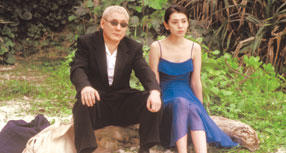
Takeshis’ (Takeshi Kitano) 81 - There’s a term among anime fans used when the creators of a program insert gratuitous references for the most ardent viewers of a show called “fan service”. Takeshis’ Japanese director Takeshi Kitano’s latest, most playful, and possibly best film is essentially his “fan service” movie. In it Kitano, who has always had something of a split screen personality (he’s known by the pseudonym “Beat” Takeshi when he’s credited as an actor, after all), begins to deconstruct his persona by explicitly revisiting the majority of his body of work, while in the guise of a sad sack doppelganger also named Kitano.
Clearly the closing of a chapter in the director’s oeuvre (don't expect more Yakuza films after this), the film examines Kitano’s frustrations and creative process. The way it does it, however, makes comparisons to 8 1/2 less useful than you might think. Playing out as a series of wildly imagined comic vignettes, the movie doesn't wallow in the notion that the artist possesses a tortured soul that he must harness in order to give to the world. Instead, it seems to plunge headlong into that soul, giving us a fantasia of sequences that give perspective into the works that they reference.
That sounds headier than this incredibly funny movie even tries to be, and I'm afraid my tiredness might be getting the better of me already, but this incredible mash-up of Kitano's favorite obsessions and cinematic tricks (I love the associative editing here...) demands to be seen. With a snappier pace than Kitano usually delivers, it finds the director freed from genre and plot, able to deliver a huge chunk of pure cinema for his and our pleasure. The last forty minutes in particular give the impression that Kitano has been unbridled. Featuring several essentially inconsequential shootouts (I think one of Kintano's big goals here is to simply point out that it's pretty damn cathartic to shoot someone that you find annoying... though he's also underlining the moment of connection that the participants in a stand off feel before they start shooting) and a full-blown musical revue, it is a celebration that's almost enough to make Zatoichi's final scene look boring.
Bonus ratings: October 17, 1961 (Alain Tasma) 35
Instructions for a Light and Sound Machine (Peter Tscherkassky) 63
Banileue 13 (Pierre Morel) 34



No comments:
Post a Comment